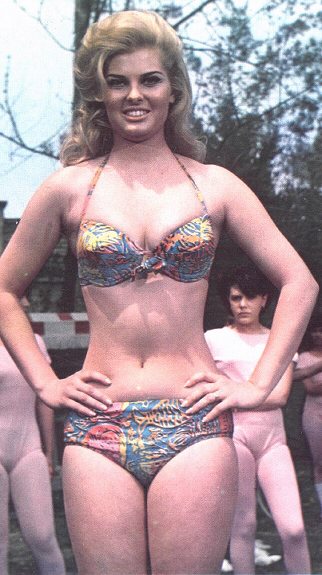No se mande profe
[Don't Be So Bossy, Professor]
(Filmex, 1967) Dir: Alfredo B. Crevenna; Scr: Edmundo Baez; Story: Edmundo Baez, Mauricio Wall; Photo: José Ortiz Ramos; Music: Sergio Guerrero; Playbacks Dir: Armando Manzanero, Ernesto Cortázar Jr.; Prod Mgr: Antonio H. Rodríguez; Prod Chief: Fidel Pizarro; Asst Dir: Ignacio Villareal; Film Ed: Rafael Ceballos; Art Dir: Jorge Fernández; Decor: Adalberto López; Camera Op: Hugo Velasco; Lighting: Gabriel Castro; Makeup: Dolores Camarillo; Music/Re-rec: Roberto Camacho; Choreog: Jorge España; Union: STPC; Eastmancolor
CAST: Enrique Guzmán (Francisco Montiel), Hilda Aguirre (Beatriz de la Torre), Sara García (doña Claudia), Héctor Suárez (Fausto), Amedee Chabot (Srta. Nielsen), Berta Moss (Srta. Orvañanos), Renata Seydel (Otilia), Beatriz Mayo (Juana Villanueva), Fanny Schiller (director of school), Claudia Martell (student), Sergio Ramos (eye doctor), Queta Lavat (teacher), Burdett Zea (student), Alfonso Torres [aka Juan Miranda] (gym teacher), Armando Acosta (elevator operator), Queta Carrasco (woman reading newspaper)

NOTES: this is a routine romantic comedy, not especially original, well-paced or well-written. Not much goes on and the conclusion is very predictable. The entire central premise is hard to swallow, and some loose ends are left dangling (for example: Francisco says he can only sing in the shower, but he later overcomes his reluctance to sing in public with no apparent effort). To be honest, there are a couple of nice songs, one amusing dream sequence, and even a good line: Francisco goes to an eye doctor to get contact lenses, and can't read the eye chart. The doctor (Sergio Ramos) says, "this isn't a case for contact lenses, it's a case for a dog and a cane."
Francisco teaches literature at a girls' boarding school. One of students is Beatriz, who has a crush on him. However, after she relates a dream in which Francisco appeared as a James Bond-style secret agent (who parachutes into a desert oasis, shoots a machine gun, and catches bullets in his teeth!), Francisco becomes self-conscious, thinking he isn't macho enough for her. His roommate Fausto has been trying to convince Francisco to try for a singing career (normally he only sings in the shower). Using the name "Javier," Francisco goes on TV and is a big hit.
His students are enthusiastic about the new singer, whom Francisco says is his twin brother. Both Francisco and "Javier" court Beatriz (Fausto takes up with Otilia, Beatriz's roommate), but she can't decide between them. Francisco and Javier (really Fausto in disguise) participate in a motorcycle race, and one the two "brothers" allegedly dies (Francisco is waiting to see which one Beatriz loves before he settles on the victim). Doña Claudia, Beatriz's grandmother, forces Francisco to confess the plot. As the film ends, Beatriz sees both Francisco and Javier singing to her, and realizes they are two sides of the same person.
Amedee Chabot's role in No se mande profe is quite atypical for her. She rides up to the school on a motorcycle, and is introduced as "Señorita Nielsen," a new teacher from Sweden. Her modern methods clash with the conservative ideas of Señorita Orvañanos, another teacher (the director of the school is temporarily away). Nielsen puts up classical (nude) statues in the garden to "inspire" the students, brings in a television set (wow), sponsors an intra-school beauty contest, and--to top it off--hires a male gym teacher (playing by the muscular Alfonso Torres aka Juan Miranda, wearing skimpy black swim trunks). She also "teaches" psychology by showing the students Rohrshach inkblots.
Although (of course) Amedee has one (brief) scene in a bikini, for most of the film she is made up and costumed to appear older and more sophisticated than the students (in her final scene she looks very nice in a red dress). However, her dialogue is dubbed in a rather annoying fashion: perhaps to suggest a "Scandinavian" manner of speaking, she talks in a stilted, staccato manner (the dubbing does appear to match her lip movements well, however).
The rest of the cast is adequate. Enrique Guzmán gets to sing a number of songs (including "Guantanamera" and "Adoro"), and exposes a shocking lack of upper-body development in a shower scene. Hilda Aguirre, not one of my favorite performers, is OK here, and has two songs of her own. On the positive side, Renata Seydel has one of her more substantial roles as Otilia, who brags about her romantic correspondence with Alain Delon and Marcelo Mastroianni (Beatriz looks at an inscription on Delon's photo and says "this looks like a woman's handwriting").
Overall, routine at best, although the film did have a seven-week opening engagement in Mexico City in 1969, so somebody must have liked it.
Back to the Amedee Chabot Filmography.
Posted 1 May 2000, updated 25 August 2000 by D. Wilt (dwilt@umd.edu)